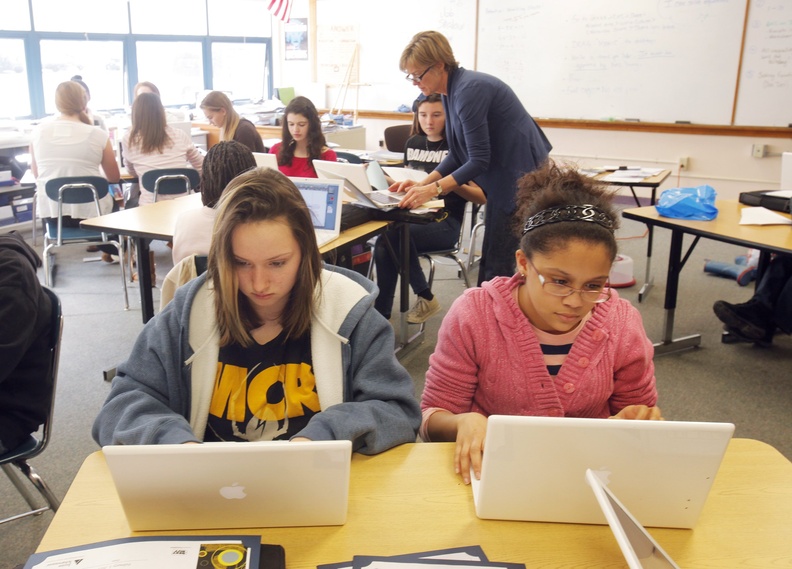A weeks-long delay in the awarding of the next contract for Maine’s school laptop program is causing anxiety for school officials who are up against their own budget and planning deadlines.
The state is negotiating a contract to buy tens of thousands of laptop computers and related training, repair and support services for its program, the Maine Technology Learning Initiative.
This year, Maine is leading a multistate contracting effort that is also open to Hawaii and Vermont. The combined contracts are likely to be worth more than $200 million.
The delay in making a final award for Maine has created a difficult situation for school districts, most of which have finalized their budgets for the year that starts July 1 or will do so in the next week or two.
The state Department of Education selected five semifinalists earlier this year and hoped to announce the winner of the Maine portion of the contract in late February or March. School districts’ technology officials say they expected a decision by late March.
But the list of semifinalists remains with the Governor’s Office, which has not made a final decision.
“All contracts above a certain size have to be approved by the Governor’s Office,” said Education Department spokesman David Connerty-Marin. “We have been working with them to come up with the right solution. It’s a very large contract that we will be working with for at least four years, so obviously we want to make sure we work it through.”
Kerry Gallivan, technology director for School Administrative District 75, which serves Topsham and three neighboring towns, said Thursday that “we’re wrapping up the final vote on the budget this evening in our district, and I’ve yet to be able to present to the school board any sense of what is going to be the final price point for new devices and what resources will be needed for professional development if it’s going to be a new device.
“It’s so late in the process that there’s now speculation that there might not be any devices at all,” he said.
Under the laptop program, the state pays to provide computers to every seventh- and eighth-grader in Maine. Districts that provide laptops to students in other grades pay for the computers themselves, along with maintenance and repairs, and that cost can be significant.
“It’s very difficult to stand up in a presentation to the public and to have to tell them I can’t say how much these devices will cost and what kind they will be,” said Dean Emmerson, director of technology for Regional School Unit 1, which serves Bath and three other towns. “The answers to these questions affect whether we’ll be able to participate at the high school level or not.”
Many districts are worried that if the state doesn’t choose the least expensive option, they won’t be able to buy devices for their high schools. The proposals chosen as semifinalists range from $266 to $345 per user.
“We can (afford) the low proposal, but we frankly don’t have any money to go higher than that,” said Crystal Priest, district technology coordinator for MSAD 4, which encompasses Guilford and five neighboring communities and has bought laptops for all of its high school students. “If the low bid is also the highest scoring, it seems like a no-brainer.”
The lowest-cost and highest-scoring bid is for Apple’s 32-gigabyte iPad tablets.
Schools now use MacBook laptops. Technology directors said they will have precious little time to organize training for teachers if the state chooses a radically different device.
Three of the five semifinalist devices aren’t made by Apple, so teachers could have to become proficient with a different platform, such as Windows 8.
“Three of the five devices would represent a substantial shift in how we deliver instruction, and we need all the time in the world to help our teachers to come out of the gate and be comfortable with teaching with them before September,” said Andrew Wallace, director of technology for South Portland’s school department, which now has 1,450 laptops. “Our teachers and students are extremely resilient, but not knowing what the device is is really prohibiting planning.”
Schools also face a May 2 deadline to report to the Education Department how many of their leased laptops they intend to buy from the state (for $49 each) to use for other purposes, such as for elementary students. School officials say it’s impossible to answer that question when they don’t know how many of the new computers they will be able to afford.
In Topsham, Gallivan said SAD 75 would like to buy 250 of its leased MacBooks, upgrade them and use them for elementary students, who have to take state-mandated achievement tests on computers.
If the state chooses one of the more expensive semifinalists, the district might instead have to buy 840 of its old MacBooks and keep them in the hands of Mount Ararat High School students.
Priest, in SAD 5, said the delay means that teachers will have to return their old computers to the state weeks before they can get new ones, so they will be without equipment to work with or train on this summer.
“The deadlines are really starting to back up, and nobody can give us a reason for the holdup,” she said.
LePage’s spokeswoman, Adrienne Bennett, said, “The governor is assessing the options and there will be a decision very soon.”
Colin Woodard can be contacted at 791-6317 or at:
cwoodard@pressherald.com
This story was updated at 11:10 a.m., April 26, 2013, to add a comment from Adrienne Bennett, Gov. LePage’s spokeswoman. and to correctly identify Crystal Priest, district technology coordinator for MSAD 4, which encompasses Guilford and five neighboring communities.
Send questions/comments to the editors.


